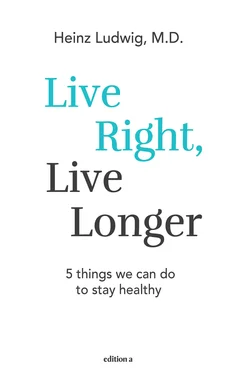Heinz Ludwig, M.D.
Heinz Ludwig, M.D:
Live Right, Live Longer
All rights reserved
© 2017 edition a, Vienna, Austria
www.edition-a.at
Editing: Andreas Görg
Cover: JaeHee Lee
Layout: Lucas Reisigl
E-Book-ISBN: 978-3-99001-377-9
E-Book-Production and delivery:
Brockhaus Commission, Kornwestheim
www.brocom.de
MARTHA ALLEN
ROBERT TUCKER
A PLAN FOR LIFE
LOVING
Compassion in the Health System
Contented Loners
Unhealthy Egotism
The Health Effects of the Digital Revolution
Healthy Love Between Two People
Esteem Within Social Circles
Adaptability in Partnerships
Sexuality and Health
Undervalued Physical Contact
The Healing Effect of Pets
Passion as a Health Factor
LAUGHTER
Healthful Comedies
Practice Laughing
A Brighter Prevailing Tone in Life
The Harmful Dogma of Positive Thinking
Where Our Life’s Happiness Lies
Love Is a Chemical Reaction
LEARNING
The Interactions Between the Body and the Brain
Mental Lethargy
Thinking and Subordination
Suppressing Inquisitiveness
Hard Times for Our Brain
The Future of Learning
Learning About Ourselves
What Fuels Our Learning
The Intelligent Management of Our Health
LIFELONG FITNESS
The Preventive Effect of Physical Activity
The Effect of Physical Activity on Our Brain
Physical Lethargy
LIGHTER EATING
The Most Difficult of All Changes in Eating Habits
Fighting for the Right Thing
What Industries Promise Us
Fasting for Health and Healing
Healthy Realism With Regard to Eating
The Obesity Epidemic
Preventing Cancer With Proper Nutrition
IT’S UP TO US
Genetic Predisposition
Survival of the Fittest Is a Thing of the Past
The Significance of Environmental Influences
The Tiresome Issues of Smoking and Alcohol
The Question of Personal Responsibility
The Old Values
REFERENCES
She appeared as agile and impatient as she had on her first visit to me, a petite, forty-year-old woman. With her findings in hand, I motioned to the seating in my practice. »Well,« she asked, »What did the biopsy reveal?«
I would not have thought Martha Allen younger than she was. However, she was one of those people who have retained at forty the energy of their early youth.
A subway door had closed on her and the pain had not gone away. She remembered that she had had pain previously that she had ignored. She had also suffered from an unusually stubborn flu. Her more recent problems had been emotionally more trying than usual, and she had been altogether more debilitated.
Martha Allen suffered from breast cancer with bone metastases, which was confirmed by the new test results. The fact that I have delivered many such diagnoses in the course of my professional life does not mean that it has become routine for me.
Some patients have great difficulty in processing all the eventualities of a grave diagnosis and prefer the situation to be laid out gradually. I therefore asked her how much detail she wanted me to go into. I also offered to discuss some issues and questions in the course of upcoming appointments to give her time to process the information gradually. But Martha Allen thought nothing of that or of beating about the bush. »1 want to know,« she said. »How does it look?«
»I’m afraid I don’t have good news for you,« I said. She had evidently expected that. In any event, a brief flicker in her eyes was all the emotion she showed.
I handed her the findings and told her the result of the examinations.
She looked at the findings, apparently without reading them. But she did not seem paralyzed; she seemed rather to be pursuing a concrete thought. Finally, she raised her head. »How much longer do I have?« she asked.
Some patients do not want to know that. Others consider for quite a while whether they want to know or not. Understandable, because someone who has to deal with the information, for example, that she has an estimated thirty months left to live, can easily lose the ground under her feet.
In serious illnesses like cancer it is common practice for doctors – at least in the United States, where litigation is common – to turn on a tape recorder and press »record,« before beginning to discuss the situation with the patients and their closest relatives. Their statements are formulated in a legally incontestable manner. The patient is told, »Your average life expectancy is thirty months,« which is documented with the relevant references. Then the available treatments, their benefits, and the risks involved are listed objectively. And this is done with good reason, since every misinterpreted word can be used against the doctor in any possible lawsuit. But when it comes to cancer diagnoses, I do not think much of giving concrete information about expected survival time. These are average values that say little about an individual patient’s prognosis. Patients and the course of their illness always differ. On the basis of the findings and the patient’s status, i.e., the aggressiveness of the cancer and the fitness of the patient, I can assess reasonably well whether the disease course will be favorable or rather unfavorable, but I can’t do more than that.
I currently look after and follow several patients who, on the basis of the statistical average, should no longer be alive. Even patients of mine with difficult-to-cure cancers such as pancreatic cancer, with an estimated life expectancy of eight to twelve months, lived for years after the diagnosis or are still alive.
Unusual disease courses can never be ruled out, especially as medicine is making rapid progress. If patients do not ask, then I do not mention any concrete figures on the subject of survival time. Instead, I tell them about cases in which people have coped particularly well with their illness. That gives them hope, and hope is a strong motivating force. If, however, they insist and want an answer to the question, I draw a survival curve that shows how different the course can be. It shows that there is an average, but that some patients die very early and others survive unexpectedly long.
But Martha Allen was not interested in any curve. She definitely wanted to hear a number. To be absolutely sure, I asked her again. "Are you certain? Please think about it again. Perhaps you‘d like to sleep on it."
She shook her head. "I have to know," she said. "My daughter is still in school and I’m a single parent. I need to know what she can expect."
Her cheeks were now reddened. That was the only sign that she was in a situation that no one would want to be in. She was a fighter, that much was clear, and if a patient wants clarity, then my job as a doctor is to provide it.
"The average life expectancy for your illness at this stage is three to four years," I said. "That’s just an average, as I said. It can be less, but it can also be more. Average values are just average values."
We discussed the therapies available, their advantages and disadvantages, as well as possible side effects. The histological examination showed that the tumor was hormone-sensitive, which meant that hormone therapy could be used and for the time being at least, chemotherapy, which is associated with more severe side effects, would not be necessary.
Martha Allen had already said goodbye when she turned around again at the door of my practice. "My daughter is twelve now," she said. "She has six more years in school. I have to hold on that long. After that she’ll be able to manage without me."
Читать дальше












